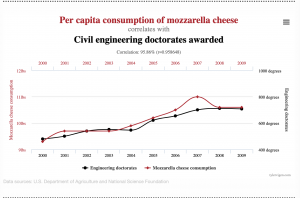I found the podcast today about statistics particularly interesting because I have previously discussed similar topics in my past psychology and sociology classes. In sociology we talked about how all statistics are biased and are being used by the person who is presenting it to accomplish a particular agenda. As the podcast went over we often trust statistics because we think they are scientific and seem rational but we need to dig deeper because not only the numbers in the statistic could be wrong but the way the author chooses to present or the reader chooses to interpret the statistic could be wrong or change the meaning. Even the census which seems like a neutral source of statistics can be used to accomplish an agenda such as allocating resources. So it is really important to be critical of statistics and not accept them purely at face value.
The graph I chose is similar to the example that Dr. Bezio mentioned in the podcast about how the number of people who drowned by falling into a pool correlated with films Nicolas Cage appeared in. My graph shows that per capita consumption of mozzarella cheese is highly positively correlated with civil engineering doctorates awarded. This is a spurious association because these two variables alone, mozzarella cheese consumption and civil engineering doctorates, are associated but either due to coincidence or another third factor. I chose this graph in particular because I think it is interesting that these two variables are seemingly so random and one would think that they should not show any association when in fact they show a quite strong association. The statistics presented in the graph are bad statistics and is an example of why one needs to be critical of the statistics we encounter and not accept them at face value.


I really liked the way you connected this topic to your psychology and sociology classes. Also, the fact that the census can be presented with such bias is kind of scary. I definitely fall into the trap of wanting to believe a source before I want to disprove it, especially when it comes from a source of authority like the government. As you and the podcast mentioned, we have to be more aware, though.
I think that your comments here are really interesting because it shows that bias creeps its way into every aspect of our lives, even the ones that should be neutral like the census. I’ve seen a lot of graphs like this one as a student (number of Nick Cage appearances is a popular statistic in these for some reason), a really popular one that’s stuck with me is the fact that the number of ice cream sales seems to be positively correlated to number of murders. This is actually just because the heat makes people want ice cream and more violent, which is the third variable that the reading talked about.
I too noticed some similarities between Dr. Bezio’s podcast and what I learned in my psychology classes in the past. Last semester it was actually scary how many “studies” we read that completely fabricated or exaggerated the evidence and which were published and read by many. Also, this graph made me laugh.
I think it is a little extreme to say that all statistics are biased. Yes, whoever is conducting the study is probably hoping for one outcome of the other. But there is a reason the scientific method exists and is used in experiments that produce statistics. We can have confidence in studies that are done correctly with adequate sample sizes, reported standards of error, confidence intervals, and other pertinent information. Sure, there are definitely a lot of studies that get by without telling the full truth. But to say that all statistics are biased could potentially help a lot of people discount the importance of statistics in our society today.